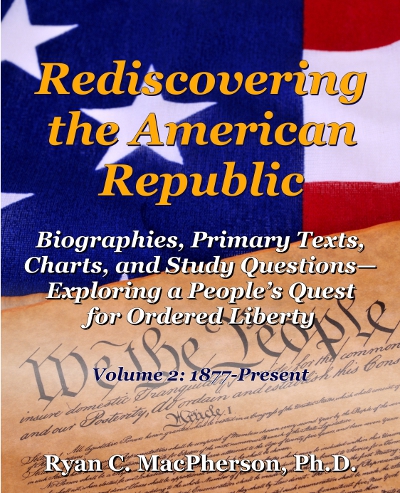A student’s mother recently sent me an inquiry:
What would you recommend as a worthwhile book to introduce the big ideas that a high school or college student would need to understand when studying government? I have in mind concepts such as liberty, authority, natural law, etc. Do you know of any books that address these themes particularly from a Lutheran perspective?
Here are three books to recommend, in reply to her question. I’d probably read them in the sequence presented.
- Frédéric Bastiat, The Law is a classic, written by a French political philosopher, arguing for the rule of law (a government under laws, not a government of men who think they are above the law). He specifically opposed socialism. This is short and quite readable.
- Edmund Morgan, Birth of the Republic explains the ideas of natural rights and the rationale for the American Revolution. It is brief and accessible in its language. My students at Bethany Lutheran College who have become elementary or high school history teachers have used this book as a refresher for the course that I teach on the American Revolution.
- Larry Arnn, The Founders’ Key, identifies core concepts of liberty, natural rights, etc., that America’s founding fathers had in mind, and argues that America is losing these concepts and needs to recover them soon. This also is quite readable.
As for a Lutheran perspective, here are two more:
- Allen Quist, America’s Schools, includes a chapter on the twelve pillars of liberty found in the Declaration of Independence—including natural law, natural rights, limited government, etc. His book also is fairly brief and quite accessible. He is Lutheran, but he does not specifically indicate his Lutheran faith in this book. By the way, he also was our speaker for Evidence for Easter at Bethany—please share that link (free video archive) with your friends!
- John Eidsmoe, Historical and Theological Foundations of Law, is a 1,500 page comprehensive treatment, in 3 volumes, that will teach you virtually everything you ever need to know on this subject. He is Lutheran. He compares Lutheran with Roman Catholic and Calvinist perspectives on natural law, natural rights, the doctrine of interposition, etc. (My take on Interposition, if you aren’t familiar: here and with futher discussion here). I use Eidsmoe’s book at Bethany for a senior-level history course that our Legal Studies majors also take. It is a challenge to work through, just so you know, but it is well worth the effort. At the end of the semester we have a conference call with the author, so my students can ask him questions about his book.
By the way, John Eidsmoe and Allen Quist are both scheduled to speak (as am I) for the June 21, 2018 apologetics conference at Bethany Lutheran College. You can be sure that each of us will mention “natural law” at least once!
P.S. On natural law in general (not limited to political science applications), see Natural Law: A Lutheran Reappraisal. I contributed a chapter entitled “The Natural Law of the Family.”


